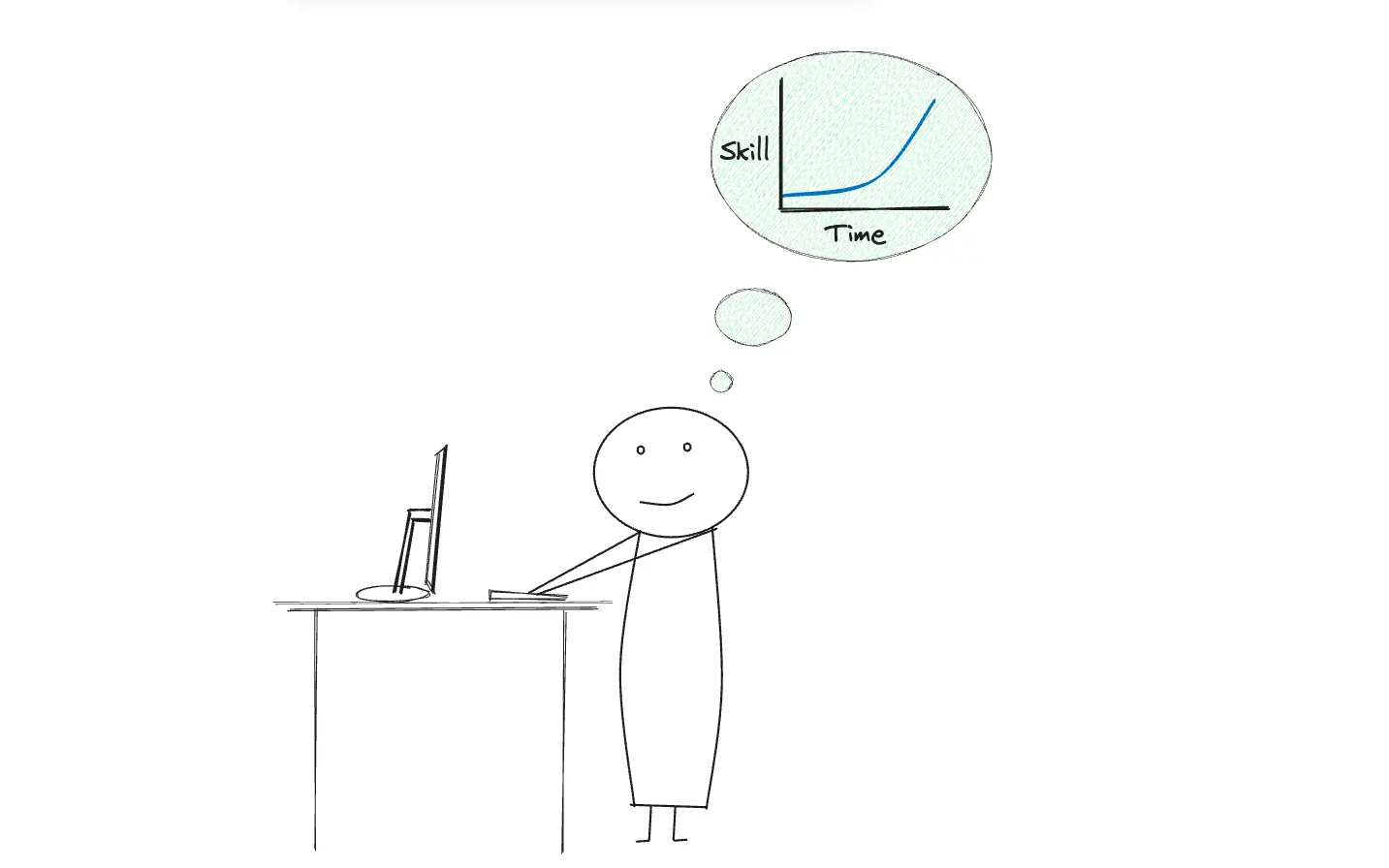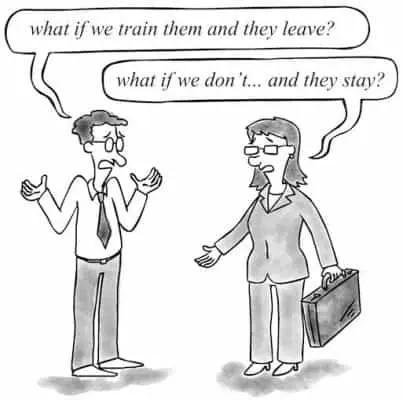
The benefits of a development plan at work
Oct 04, 2023 - 5 min readIntro
The reason why most people change jobs is because they either want to try something new or feel stuck in their current job. Without saying a development plan can solve all problems, it does have a lot of benefits that can address this exact problem. When a trained employee quits, it costs the company 200% of their annual salary. (Source zavvy.io)
Add to that that providing e-learning training increases the retention rate by 60%. (Source zavvy.io)
Those are 2 very good reasons to look into why people quit and what to do about it. One of the things we do in my job is to make sure that everyone has a development plan. In my opinion, it should be a set part of each tech professional's life. The plan contributes to staying focused and moving towards shared goals in an organized way. It is perfectly combined with having a blog or portfolio, but where the portfolio is a personal project, the development plan involves the company. And I think it is equally important for both companies and employees to prioritize it.
What is a development plan
A development plan is a structured document or process that outlines an employee's goals and objectives for personal and professional growth.
It is a plan the manager and employee make together.
The purpose of the plan is to select and agree on a few key areas of focus for further development throughout the year or a longer period.
An example:
Name: John Doe Position: Software Developer Current Skill Level: Mid-level
- Master a new programming language: Learn PHP and become proficient in it within the next year.
- Actions:
- Find and take an online course
- Spend 1 hour each day coding in PHP
- Team up with a senior when facing challenges
- Get onboarded on a client PHP project
- Improve understanding and implementation of technical SEO: Get a deep understanding of the underlying best practices of technical SEO within the next year.
- Actions:
- Get an overview of available tools and select a few key tools
- Practice on your own website/company website
- 1-hour weekly meeting with the company's SEO expert to share knowledge
- Make an analysis of the technical SEO on 3 clients and present your findings to the client.
Timeline:
- Monthly check-in with manager showcasing findings.
The above is a very superficial example of a development plan but serves an illustrative purpose. It would usually contain more details in each step, follow-ups, and subgoals. It is even better if it is possible to convert it into concrete tasks that can be checked off when done.
The whole idea is that it is a shared responsibility, where the manager's role is to support and facilitate the plan, while the employee executes it. Identifying goals together and planning it also serves the purpose of a shared platform and understanding, where both parties will hold each other accountable.
It will give structure to the plan and make it possible to execute the relevant activities to help further growth.
An ideal plan is as concrete as possible, where it is very clear when a goal or subgoal is obtained. The easier it is to measure, the easier it is to document the progress. The clear expectations also make it easier for both parties to identify actions and plan the steps to reach the goals.
Why it is important
Creating and following these plans is something I consider a very high priority.
I find it very motivating to follow the growth of colleagues and share their passion.
Also, it is essential to keep people motivated and happy in their professional lives.
Here are some of the key benefits from my perspective.
Skill Enhancement This might be obvious, but a development plan provides a structured way to improve existing skills or learn new relevant things. In most jobs, it also contributes to ensuring that they stay updated with the latest technologies and best practices in their field. Most jobs and people do have a lot of growth potential and adding a structured plan will make it easier to execute.
Motivation Making and following a development plan also contributes to daily motivation and helps drive growth and fuel progress. Reaching goals and improving skill sets also provide a sense of purpose and accomplishment in the job. Lack of motivation often leads to unhappy employees and bad results.
Career Growth Combining the 2 above will lead to career growth, where each individual will get a better and more satisfying job, with relevant tasks of the right level of difficulty and maybe promotion opportunities. Also, it is possible to steer the career in the desired direction, whether it is diving deep into an expert role or transitioning into a managing role.
Retain Employees Creating and following a development plan can also contribute to employees staying at the company longer because they do not feel stuck. Being stuck can in some cases lead to changing jobs. The most used explanation for changing jobs is that employees want to try something new or different.
More Interesting Jobs
Discovering growth potential together and creating shared goals creates engagement which is very valuable for both the employee and the company.
It will improve job satisfaction while being more productive or valuable for the company.
Furthermore, it helps both the company and the employee to prepare for the future.
People tend to get more invested in their job when it has relevant future perspectives.
Attractive Workplace For the company, the development plan and the investment in the employees make it a more attractive place to work. Clarity and emphasis on individual professional development strengthen the connection between the company and its employees, fostering greater loyalty.

(image is from X)
The plan is important because it can help people get better at their current job, or even prepare them for the next job or promotion. Creating it and following it together with the manager has benefits compared to doing it alone. Often the manager's experience contributes positively, both in terms of picking the right areas of focus, but also to avoid potential pitfalls. And if made together it is possible for both parties to hold each other accountable to the agreements and motivate each other.
Perfect combination with blog or portfolio
I've previously written an article about why I think every tech professional should have a blog or portfolio. You can read it here.
This aligns perfectly with a development plan. While the blog and portfolio aim to document the growth in the past, the development plan will serve the purpose of planning the future. The combination enables the option to document the journey as well. While selecting topics for further development, the blog or portfolio can be the platform where the progress and acquired skills are documented and showcased.
Furthermore, the portfolio can be an inspiration to which topics to dive deeper into and help keep the motivation up, while looking back on the goals reached in the past.
Wrap-up
I do believe that having a development plan is pretty common, especially in tech. But if you find yourself in a position where you feel stuck or without a plan for the future, I would strongly recommend reaching out to your manager and presenting the idea.
Above you have all the mutual benefits that should resonate well with most managers and companies.
I mean, who wouldn't support a colleague who wants to become better at his job, learn new skills, and provide more value?